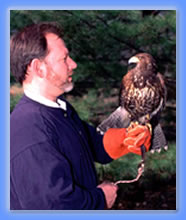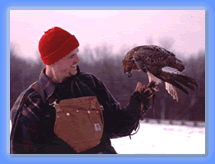SHOULD I BECOME A FALCONER?
The Ohio Falconry Association welcomes your interest in the sport of falconry. Outlined below are key points to consider in deciding if falconry is appropriate for you. Authentic falconry is quite different from legendary and mythical tales often erroneously associated with the sport in popular media.
WHY BECOME A FALCONER?
- TO TRAIN A WILD HAWK TO HUNT IN THE PRESENCE OF A HUMAN- This is falconry. Nothing in nature matches the flight of a hawk or falcon as it chases a potential meal. Success means life to the hawk. To the prey animal being chased, escape means life. This age-old predator-prey relationship is a pivotal point in falconry. A well-trained hawk will exert a stunning effort attempting to capture a fleeing animal, which likewise pours everything into its escape. More often than not the animal escapes — but the viewing of this primal interplay, with each animal exerting its utmost, is unmatched in nature. The hawk or falcon accelerates and twists itself through the air, deftly attempting to capture its fleeing target. The intended victim uses its natural gifts of escape to elude the hawk. The hawk's flight often lasts only a few seconds but is one of nature's most thrilling spectacles, one that has motivated falconers for thousands of years. Falconry is the pursuit of wild game by a hawk in the presence of its falconer. The actual kill is relatively unimportant (and by no means the motivation for the sport). It is the exemplary quality of the hawk's flight that has motivated falconers in all ages.
- TO HUNT WITH A WILD PREDATOR - Falconry requires a very deep commitment of time and energy, and that involves getting into the field with the bird and actually hunting with it. Falconry is a hunting sport, and because the birds it uses are natural predators, they must be given ample hunting opportunities.
 It is therefore important that the prospective falconer has the time to take his or her hawk hunting numerous times (typically more than once a week) during the legal Ohio hunting season. The falconer must also be capable of obtaining hunting permission for multiple locales in reasonable proximity to where they live.
It is therefore important that the prospective falconer has the time to take his or her hawk hunting numerous times (typically more than once a week) during the legal Ohio hunting season. The falconer must also be capable of obtaining hunting permission for multiple locales in reasonable proximity to where they live.
- NOT TO CATCH LOTS OF GAME - Falconry is not a very successful method of capturing game. Even the best trained hawks miss more game than they catch. On many hunting trips they catch nothing at all. Anyone interested in filling the game bag should go instead to the shooting range and practice there. A gun hunter will take far more game than a falconer for each hour of hunting time.
- NOT TO HAVE AN EXOTIC PET OR TO IMPRESS OTHERS - All falconers form a close relationship with their birds, and this is an important, even essential element of the sport. But true falconry transcends the "I love my bird" theme. Falconry hawks are not pets. Falconry is not a method of impressing others with a regal or rare pet paraded around on one's fist. Pet keeping or exotic animal display have no place in falconry and are prohibited by falconry regulations. If this is your motivation for falconry, forget it now. This is not falconry.
- NOT TO POSSESS A HAWK FOR PROFIT OR EDUCATIONAL PRESENTATIONS - Ohio falconers are not permitted to use their hawks for monetary gain. General and Master Class falconers may use their hawks for non-profit educational presentations, however possessing a hawk soley for that purpose is prohibited. Persons interested in doing educational presentations with live raptors should contact and volunteer at one of Ohio’s raptor rehabilition facilities. The use of falconry hawks for profit in historical re-enactments, renaissance fairs, and/or wildlife modeling activities is strictly prohibited in Ohio.
WHAT IS REQUIRED TO BE A FALCONER IN OHIO?
- KNOWLEDGE - A prospective falconer must learn everything
 he or she can about the history, terms, techniques, and regulations of the sport. A broad knowledge of the biology and natural history of birds of prey must be acquired, along with an ability to spot and identify wild raptors in Ohio.
he or she can about the history, terms, techniques, and regulations of the sport. A broad knowledge of the biology and natural history of birds of prey must be acquired, along with an ability to spot and identify wild raptors in Ohio.
- HUNTING LICENSE - Ohio regulations require that all hunters, including falconers, possess a valid state hunting license. For those who do not have one, this may require the taking of a hunter safety course. The Ohio Division of Wildlife and many retail outlets selling hunting licenses can provide information on qualifications for purchasing a hunting license.
- FALCONRY PERMIT - Falconry is tightly controlled by state and federal regulations, assuring that only highly motivated and qualified individuals are allowed to possess and train birds of prey. The welfare of both wild raptor populations and hawks in captivity are fundamental concerns. The required State of Ohio falconry permit fee is $75 every three years and the Federal permit is $100 every three years.
- AGE - The minimum age for falconers in Ohio is 16.
- FALCONER SPONSOR - Falconry permits are issued only to those working under the active, recorded sponsorship of a licensed General or Master falconer. There are three classes of falconers. Apprentice falconers are beginners working toward General falconer status. General falconers have passed all apprentice qualifications and are authorized to practice falconry using the most common species of hawks. Master falconers have at least five years of falconry experience at the General level, have demonstrated advanced levels of proficiency, and are authorized to use the most demanding species of hawks. Prospective falconers must personally arrange to have a General or Master falconer as his or her apprentice sponsor. Apprentice falconers are not permitted to take the test, build facilities, or be issued permits without first having the commitment of a sponsor. Because of the relatively small number of falconers in Ohio, sometimes new apprentices may have to wait months or years for sponsors to become available. Because of the many variables involved in the sponsor/apprentice relationship, sponsors are under no obligation to take on new apprentices.
- FALCONRY TEST - Prospective falconers must take an intensive written test or examination given by the Division of Wildlife. The test usually takes one to two hours to administer and has a $75 fee. It broadly covers all falconry topics, including raptor biology, field identification, natural history, pathology (the prevention and treatment of hawk diseases), falconry history, terms, techniques, and knowledge of raptor protection and falconry laws and regulations. An 80% score is required for passage.
- FALCONRY EQUIPMENT AND FACILITIES - Trained hawks must be properly cared for, and state and federal regulations prescribe certain high standards. Before a permit is issued, a prospective falconer must
 fabricate or acquire all of the standard falconry equipment used in the proper care of a hawk. Modern falconry regulations require the availability of both a mews, an enclosed interior room or building for general perching of a bird, and a weathering area, a protected exterior area where the bird can perch in fresh air and bathe. These must be inspected and approved by the Division of Wildlife before a falconry permit can be issued. . A thousand dollars can be easily spent on required falconry equipment and facilities in the first year.
fabricate or acquire all of the standard falconry equipment used in the proper care of a hawk. Modern falconry regulations require the availability of both a mews, an enclosed interior room or building for general perching of a bird, and a weathering area, a protected exterior area where the bird can perch in fresh air and bathe. These must be inspected and approved by the Division of Wildlife before a falconry permit can be issued. . A thousand dollars can be easily spent on required falconry equipment and facilities in the first year.
- RAPTOR CAPTURE PERMIT - After the falconry test has been passed and equipment and facilities approved, a raptor capture permit can be purchased. The hawk to be trained, almost always an immature red-tailed hawk, can then be humanely trapped during the second half of the year. Hawks cannot be taken from the wild during the breeding season, nor can nestlings be taken. Only immature birds may be trapped (no adults, with the exception of kestrels). The sponsoring falconer must be present while the bird is being trapped. The newly acquired bird must have an identifying band placed immediately on its leg, with the band number recorded with both state and federal wildlife authorities. Training can then begin under the guidance of the sponsor.
HOW DO I START?
GET MORE INFORMATION - If, after considering all of the above, you think you have a legitimate interest in falconry and are willing to undertake the required tasks commitment, you should gather the following information:
- FALCONRY REGULATIONS - You need to read, study and understand the Ohio falconry regulations. These can be downloaded on this web page or by contacting the Ohio Division of Wildlife, Enforcement Section, 1840 Belcher Dr., Columbus, OH 43224 (or call 614-265-6320). You will also need to get an apprentice application form from the Ohio Division of Wildlife
- EQUIPMENT AND BOOKS - You will need to start looking into obtaining the proper falconry equipment and reading materials. Some of the equipment can and should be made personally by the falconer under the direction of his or her sponsor. A number of reputable equipment and book suppliers exist and many have sites on the world wide web. While the OFA does not endorse any one supplier, the following is a list of links for well known sources:
Northwoods Limited www.northwoodsfalconry.com
Western Sporting Publications www.westernsporting.com
Mike's Falconry Supplies mikesfalconry.com
Click here for a list of recommended readings
- FALCONRY ASSOCIATIONS - You are highly advised to apply for membership in both the state and national falconry organizations. Both produce helpful publications and put you in touch with current practitioners. It can be difficult to find a sponsor without association memberships. The sharing of falconry ideas, experiences, and responsibilities generally requires affiliation with the state and national organizations. To protect the privacy of its members, the Ohio Falconry Association does not distribute its members’ names or addresses. Such information only becomes available after becoming a dues paying member of the Association. Write to the Secretary for an OFA membership application at Ohio Falconry Association, 2412 Scheid Rd., Huron, OH 44839 or email info@ohiofalconry.org. Information on the North American Falconers Association can be obtained at http://www.n-a-f-a.org/.


 It is therefore important that the prospective falconer has the time to take his or her hawk hunting numerous times (typically more than once a week) during the legal Ohio hunting season. The falconer must also be capable of obtaining hunting permission for multiple locales in reasonable proximity to where they live.
It is therefore important that the prospective falconer has the time to take his or her hawk hunting numerous times (typically more than once a week) during the legal Ohio hunting season. The falconer must also be capable of obtaining hunting permission for multiple locales in reasonable proximity to where they live.  he or she can about the history, terms, techniques, and regulations of the sport. A broad knowledge of the biology and natural history of birds of prey must be acquired, along with an ability to spot and identify wild raptors in Ohio.
he or she can about the history, terms, techniques, and regulations of the sport. A broad knowledge of the biology and natural history of birds of prey must be acquired, along with an ability to spot and identify wild raptors in Ohio.  fabricate or acquire all of the standard falconry equipment used in the proper care of a hawk. Modern falconry regulations require the availability of both a mews, an enclosed interior room or building for general perching of a bird, and a weathering area, a protected exterior area where the bird can perch in fresh air and bathe. These must be inspected and approved by the Division of Wildlife before a falconry permit can be issued. . A thousand dollars can be easily spent on required falconry equipment and facilities in the first year.
fabricate or acquire all of the standard falconry equipment used in the proper care of a hawk. Modern falconry regulations require the availability of both a mews, an enclosed interior room or building for general perching of a bird, and a weathering area, a protected exterior area where the bird can perch in fresh air and bathe. These must be inspected and approved by the Division of Wildlife before a falconry permit can be issued. . A thousand dollars can be easily spent on required falconry equipment and facilities in the first year.